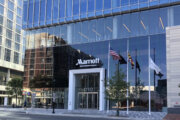WASHINGTON (AP) — Two years ago, Pfizer was the envy of the pharmaceutical world, with more than $100 billion in annual sales from its COVID-19 vaccine and antiviral Paxlovid.
Today, CEO Albert Bourla is trying to turn the page from that success story, which has turned into more of a financial headache for the global drugmaker.
Lofty expectations for continuing sales of vaccines and antivirals have fallen short, sending Pfizer’s stock price tumbling to about half of its peak during the pandemic. Bourla has responded with a $4 billion cost-cutting effort, including layoffs, and new investments in drugs for cancer and obesity.
The transition hasn’t been easy. Company shares dropped again in December when Pfizer said it would abandon its twice-a-day formulation of an obesity pill due to an unacceptably high rate of side effects. The company continues to study a once-a-day version.
Bourla spoke to The Associated Press about the company’s COVID-19 business and his efforts to move beyond it. The transcript has been edited for length and clarity.
Q: How important are COVID-19 vaccines and Paxlovid to Pfizer’s future?
I think the two products you mentioned will continue to be very important products for Pfizer because COVID-19 will continue to be important. And those products will continue offering the best solution, in the minds of most people.
They’re not going to be as big as we thought last year when we gave an expectation of approximately $20 billion revenue. The reality was that they were closer to $10 billion. But that difference was not because we miscalculated the COVID-19 epidemiology, actually it came out exactly as we thought. But what has happened is that a lot of the contracts that governments had with us, they decided to challenge them. And although they didn’t have any legal merit, we felt that it was not the right thing to take governments to court. So we decided to settle with that.
Q: What is Pfizer getting from its $43 billion purchase of cancer drugmaker Seagen?
Seagen is the leading company in a new technology that is called ADC, antibody-drug conjugate. Let me try to use military terms to describe them. Cancer is the enemy. And in the past, we were fighting this disease with methods like those used in the Second World War. So the Allies would bomb the entire place, hoping that they will hit the most important targets.
This is how chemotherapy was working. We release chemotherapy into the body and it is attacking the cancer cells but at the same time is also attacking the healthy cells. The ADCs are more like modern warfare, with GPS-guided missiles. They have a system, which is the antibody, that is programed to identify the cancer cells among the billions of cells in our body and attach to them. It just goes to them and the drug is like the warhead on the tip of the missile.
With Seagen, we were able to get not one, but four products, that are already in the market; 13 programs in clinical trials that will hopefully become products; a set of patents and intellectual properties and, of course, a group of thousands of extremely skilled scientists.
Q. Where does Pfizer’s pill version of popular obesity injections fit into the marketplace?
Of course, everybody wants to lose weight, but if they have an option, a lot of people would choose the option of a pill. It remains to be seen, but in the data that we have seen in our Phase 2 studies, we believe we’ll have good tolerability and good efficacy. It’s important to note that danuglipron has been studied in more than 1,400 patients globally, so we know a lot about the molecule. And now we are looking to develop the once-a-day pill.
Copyright © 2024 The Associated Press. All rights reserved. This material may not be published, broadcast, written or redistributed.







